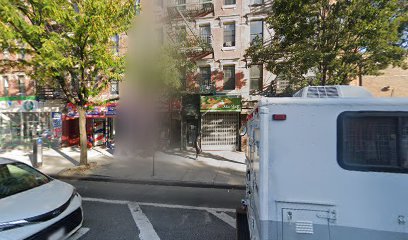Health, animal treatment top of mind for customers
Rick McGinnis/Metro Toronto
Marlon Pather, owner of The Butchers, centre, with, from left: Elizabeth Bzikot (Best Baa Farms), Belle Ahrens (Betolianni Farms), Carol Fennema (Fernwood Farms) and Cynthia Beretta (Beretta Organic Farms) at Paisley Wine Bar & Grille, at a press party introducing the four women who provide organic meat to Pather’s store.
When Marlon Pather took over an old butcher shop on Yonge Street north of Eglinton six years ago, he already knew that organic products weren’t just for vegetarians.
Born in Toronto, he’d learned the butcher’s trade in England before running the organic meat counter at The Big Carrot on the Danforth, and he’d seen customer awareness of the dubious ways of the commercial meat industry grow every year.
At his shop, The Butchers, Pather has been on the vanguard of the city’s food revolution, sourcing out farmers all over the province to satisfy both the demand for organically-raised meats and locally-raised ingredients. He says the store’s growth has been “explosive,” and cites his customers’ concern for both health and humane animal husbandry.
“I think one of the biggest things is the treatment of the animal,” Pather says. “You hear horror stories about the treatment of animals — it’s a lot more open now and people hear about it all the time. People want to purchase meat that has been humanely taken care of. They also want animals that have been fed well — no hormones or antibiotics put into the animals.”
Just last month, in a room above a pub across from his store, Pather introduced four of the farmers who supply him to the media at an event showcasing the products of their farms. Cynthia Beretta of Beretta Farms, a cattle farm in King City, recalled her start in farming 15 years ago, a financial planner with CIBC who, along with her husband, a former pro soccer player, had no farming experience.
“We’d been farming a couple of years when we had a barn fire,” she recalls, shaking her head. “We lost everything and had to start over again. That’s how we met the Mennonite community, and because we were a new, young family, they re-built our barn for us, which was a great learning experience all around.”
Belle Ahrens of Betolianni Farms outside Peterborough came to Canada from Austria, and switched to cattle farming after running a dairy operation for a decade. “I think an animal that lives outside most of the year gets every aspect of healthy growth, just like us humans. They get the best feed, fresh air and water. Hay — no commercial feeds. The meat is less acidic because of it, and it’s healthier for the individual.”
Carol Fennema of Fenwood Farms, a poultry operation outside Ancaster, grew up in the country. “I was raised on a farm, so I knew I never wanted to marry a farmer, and I didn’t — I married a car mechanic.” Their country house was across the road from a farm, however, and her husband was drawn to the business, buying it from his neighbour, after which they started raising chickens to pay the mortgage. They went organic 15 years ago when there were few poultry operations who eschewed commercial feed or antibiotics. “I think when (people) eat an organic chicken, the meat tastes like what they remember — it has flavour, it has a good smell, a firm texture, very little fat.”
Born in England, Elizabeth Bzikot of Best Baa Farms says that farming is a lonely business, especially in the winter. Their operation produces both lamb meat and sheep’s milk, and they’ve diversified into cheese production, opening a plant in Fergus serviced by a co-op of sheep farms. She talks about the “five freedoms” that the English use to define humane animal farming: “Freedom from hunger, fear, thirst, the freedom to act naturally, and to have shelter.”
She’s also vocal about the punishing life of a farmer, in an industry where the economics isn’t the only thing that seems to change slowly. “What other industry talks about the ‘70s being a highlight?” Bzikot says. “Do you know of any? If you look back to what you were earning in the ‘70s compared to today, and yet we’re supposed to be happy that a lamb is worth as much as it was then.”
















